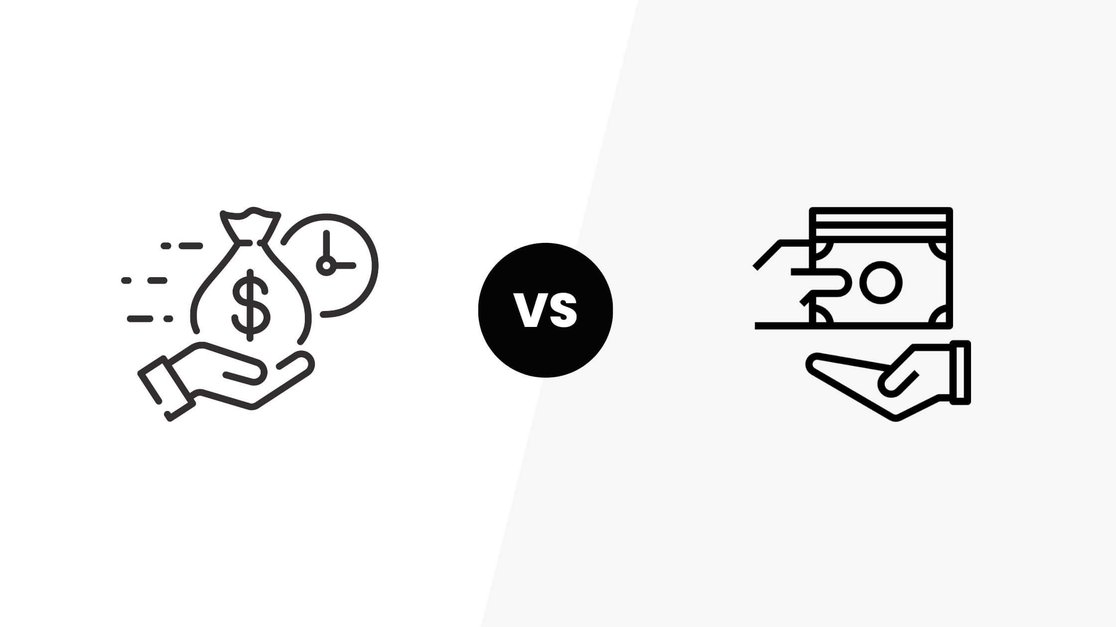- Compare the features of pay advance apps and payday loans.
- Timing, amounts, eligibility, costs and credit score impact.
- Pros and cons of both loan types.
If you need cash in a hurry before your next payday, you may think there’s little to choose between using a pay advance app and a payday loan. But the two fast cash methods are very different.
Scroll down to find out more about their benefits and drawbacks.

Coming up next
Timing
It’s quick to download a pay advance app, set up your profile and have your available borrowing amount assessed by the app provider’s AI. You could have the cash in your bank account within minutes.
For a payday loan you need to apply and then go through a credit assessment. But the assessment can usually only be carried out during business hours, so there may be a delay.
Amount available
Your pay advance amount is limited to a percentage of your regular earnings, and further restricted by an assessment of what you can afford to repay.
Most, but not all, payday loan providers will conduct a credit assessment to work out how much you can afford to borrow. Depending the assessment and the loan term, you could borrow up to $5,000.
Eligibility and credit score
For both pay advance apps and payday loans you need to be an Australian citizen or permanent resident aged 18 or older.
Pay advance apps will not check your credit score, relying instead on their internal algorithms to assess your borrowing capacity.
Most payday lenders will check your credit score and credit history, as well as looking at your current financial situation and habits. Although a good credit score will help you secure a loan, a payday lender is more likely than a traditional lender to approve a loan for someone with a lower credit score.
Credit score impact
Payday loan providers are likely to make a ‘hard enquiry’ on your credit by requesting your score and file from a credit bureau. Each hard enquiry will temporarily reduce your score by a few points. Frequent loan applications will add up to a bigger negative impact.
Also, if you are late with repayments or default on your loan, this will be reported to a credit bureau and can damage your score significantly. Even if you have no problems with payments, future potential lenders may view you as risky if they see payday loans in your credit file.
Pay advance apps, on the other hand, are not likely to damage your credit score. They don’t make hard enquiries to credit bureaus, and since your repayment is automatically debited to your bank account on your next payday, late payments and defaults are unlikely.
Overall cost of borrowing
Pay advance apps don’t charge interest. Instead they charge a transaction fee for each advance you take, varying from about $2 for apps accessed via your employer, to either a flat-fee fee $5, or possibly 5% of the amount advanced for other apps. If you pay a 5% fee for an advance you repay in seven days, it works out at the equivalent of an astronomical interest rate of 260% p.a. A flat-fee app, however, can work out to be reasonably cheap for larger amounts.
Payday loans are notorious for having high interest rates and fees. The government’s MoneySmart website says that most payday loans charge an establishment fee of 20% of the amount borrowed and a monthly fee of 4% of the amount borrowed, which means that if you borrowed $2,000 for a year you’d have to repay $3,360, the equivalent of an interest rate of 68% p.a. There may also be extra fees if you pay late.
Pros and cons
Pay advance apps
- Instant cash before payday.
- No interest to pay, just a transaction fee.
- Automated repayment, so no late payment fees.
- No credit score impact.
- Transaction fees can be high if calculated as a percentage of the advance.
- Advance amount limited to a percentage of your pay and repayment affordability.
- Current advance must be repaid before taking another.
Payday loans
- Fast cash before payday.
- Available amounts may be higher than pay advance apps allow.
- High interest rate.
- High loan establishment fees.
- High late payment fees.
- Lots of potential to damage your credit score.
Verdict
Although a pay advance can be relatively expensive if you borrow for only a few days and pay a percentage fee, it will typically cost far less than a payday loan and will not damage your credit score.
However, both loan types are best avoided if possible, and you can get some good ideas about how to do this from our Practical Financial Skills to Manage Money resource.

